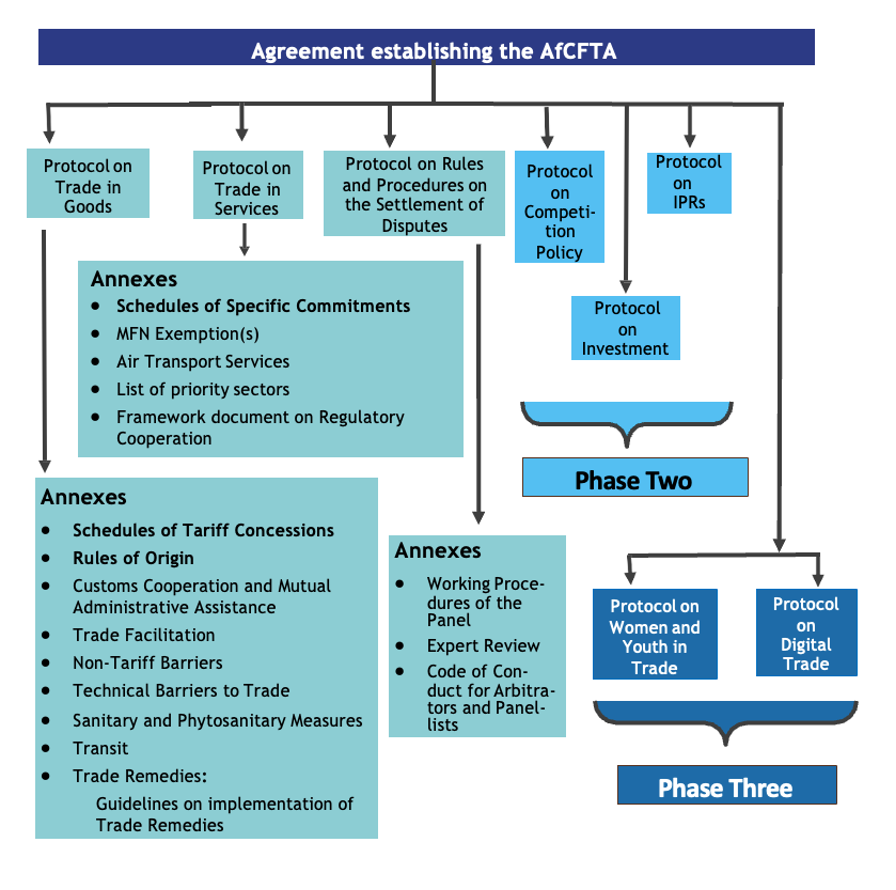Blog
Protection and promotion of the rights and interests of women under the AfCFTA

The economic, political, and moral arguments for promoting and securing the interests and rights of women traders are irrefutable. Despite some advances, women still hold fewer jobs, are paid less, and are more likely to face unique barriers and obstacles when engaging in intra-African trade. This state of affairs is politically and morally unacceptable but also undermines the efforts and policies to boost intra-African trade and economic development on the continent.
Inequality, discrimination, and a failure to adopt the necessary legal instruments and executive measures within African states and as part of the formal trade arrangements among them, are root causes of the challenges faced by women traders. The policies and measures required to address them must include domestic measures and laws as well as appropriate inter-state trade policies and obligations. The promotion of the rights and interests of women belongs on the must-do list of the African Continental Free Trade Area (AfCFTA) agenda.
When it comes to improving the position of women in international trade, there is a systemic challenge to begin with. According to a joint study of the World Bank and the World Trade Organisation (WTO) “trade policy is inadvertently biased against women, resulting in lower levels of employment and higher prices for consumer goods”.[1] Although no country overtly imposes tariffs according to gender, implicit biases can amount to barriers that put women at an economic disadvantage; as producers, traders, and consumers. Women, for example, tend to spend a larger share of their income on goods with higher tariffs, such as food. The same study recommends that targeted policies can help women to benefit from trade.
The AfCFTA offers an opportunity to remove trade barriers that impede women’s access to international markets and improving women’s access to financial services, and digital technologies. It can do so through bespoke legal instruments which will address trade-related gender issues. They should contain obligations and benchmarks which the State Parties should implement. And they should provide for new institutional arrangements.
In its original format the AfCFTA has not been designed to specifically address trade-related gender issues. The AfCFTA Agreement establishes a standard Free Trade Area (FTA) for preferential trade in goods among the State Parties, to be achieved through the AfCFTA Protocol on Trade in Goods and its nine Annexes. The AfCFTA Agreement also contains a Protocol on Trade in Services for five priority areas. These areas are transport, tourism as well as communication, finance, tourism, and business services.
In its original formal there is no AfCFTA Protocol or Annex on the needs of women engaged in intra-African trade in goods or in services. However, this does not mean that the AfCFTA Agreement cannot be shaped and be developed in order to include provisions on the needs of women. Article 23 of the AfCFTA Agreement says that “any other Instrument within the scope of this Agreement deemed necessary” can be negotiated and be added to the collection of AfCFTA legal instruments. In May 2022 consultations have begun to negotiate an additional AfCFTA Protocol on Women and Youth in Trade. This came in the wake of a decision by the Assembly of Heads of State and Government of the African Union (AU) “to broaden inclusiveness in the operation of the AfCFTA in the operation of the AfCFTA through interventions that support young Africans, women, and Small and Medium Enterprises as well as integrating informal cross-border traders into the formal economy by implementing the simplified trade regime”.[2]
Background
The Trade Law Centre (tralac) will publish a collection of Blogs in the course of 2023 in which existing AfCFTA Protocols and Annexes are discussed from the viewpoint of their implications for accommodating the needs of women as traders and as producers of tradeable goods and services. In the first of these Blogs, we provide a brief summary of how the AfCFTA has been designed and will discuss the principles and arrangements required in order to add a gender sensitive dimension to the AfCFTA. The negotiations to conclude the Protocol on Women and Youth in Trade are expected to start early in 2023, following extensive stakeholder engagement during 2022 to get feedback on specific challenges and constraints that women traders face. These engagements have also highlighted the important connections to other legal instruments and their provisions to systemically address challenges that women traders face. For example, the Protocol on Trade in Goods has 4 Annexes that deal with trade facilitation, including customs and border management – see below.[3] There is ample empirical evidence that women encounter particular challenges at border posts, including being asked for bribes, and being subjected to harassment, including sexual harassment. Addressing these challenges is essential for women to be able to trade in a legitimate, transparent and predictable manner under the AfCFTA, without harassment. This is but one example of the issues to be addressed in the Protocol on Women and Youth in Trade. This Protocol can serve as an anchor for the effective implementation of the AfCFTA, with provisions to specifically address the well-documented challenges that women traders face at border posts.

[1] World Bank and World Trade Organisation. 2020. Women and Trade: The Role of Trade in Promoting Women’s Equality https://www.tralac.org/documents/news/3989-women-and-trade-the-role-of-trade-in-promoting-gender-equality-world-bank-and-wto-july-2020/file.html
[2] Women and Youth in Trade - AfCFTA (au-afcfta.org)
[3] See https://www.tralac.org/documents/resources/booklets/4623-afcfta-a-tralac-guide-9th-edition-october-2022/file.html
About the Author(s)
Leave a comment
The Trade Law Centre (tralac) encourages relevant, topic-related discussion and intelligent debate. By posting comments on our website, you’ll be contributing to ongoing conversations about important trade-related issues for African countries. Before submitting your comment, please take note of our comments policy.
Read more...





